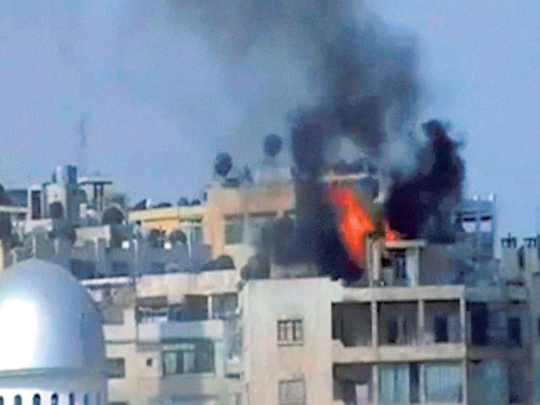
Beirut: A rebel unit of army defectors launched a major offensive against security facilities in Syria’s largest city of Aleppo, and anti-regime forces targeted air bases to try to reduce the military threat from the skies, activists have said.
The coordinated attacks by the Brigade of Free Syrians pointed to a higher-than-usual degree of planning by the rebels, suggesting that President Bashar Al Assad’s opponents are becoming more brazen as the civil war deepens.
Al Assad’s military, the backbone of his 12-year rule, is bogged down in a stalemate for control of Aleppo and unable to crush the rebels in the capital of Damascus and its suburbs. It also is fighting smaller-scale battles in the south and east.
Dubbed “Northern Volcano”, the rebel offensive in Aleppo targeted an artillery training school, a compound of the feared air force intelligence, and a large army checkpoint, according to Mohammed Saeed, an activist based in the city, which is Syria’s commercial capital. The offensive will focus on specific military and intelligence targets in Aleppo and the surrounding province of the same name, he added.
The three simultaneous attacks left an unspecified number of troops dead or wounded and badly damaged the top floor of the main, two-storey building in the air force intelligence compound, Saeed said via Skype.
The opposition Syrian Observatory for Human Rights said the areas of Hanano, Bustan Al Qasr and Salah Al Deen were shelled hours after the rebels attacked a security building in Aleppo’s Al Zahraa neighbourhood.
Activist Bassam Al Halabi said the shells were aimed at civilian areas and makeshift hospitals.
Abu Omar, a Free Syrian Army commander, said from Aleppo: “We are now adopting new military tactics, which proved very successful and we managed to down planes of the regime forces.”
Rami Abdul-Rahman, director of the Britain-based Syrian Observatory for Human Rights, also said rebels killed and wounded regime forces at an air force compound in Aleppo’s Zahraa neighbourhood, but had no details on the other two attacks reported by Saeed.
Rebels seized several areas in Aleppo last month, signalling a turning point in the conflict because the region had long been spared major violence. Rebels also control much of the wider Aleppo province, including areas on the border with Turkey.
Saeed said another Aleppo-area airport, Quiras, came under attack on Friday.
Further into the Old City, the streets taper. Families with young children walk in the opposition direction with their possessions — refugees fleeing pitched battles.
A teenage boy holding a mattress over his head warns that further in it is not safe: “There is destruction in there,” he says, before scurrying after his mother.
Rebels and government troops here fight street by street. Enemies position themselves only metres away from each other as the ziz-zag alleyways grant some protection from a direct line of fire. They know Aleppo’s stone buildings will take the blows.
In Aleppo, rebels now claim control of roughly half of the Old City, mostly to the east. Government forces and Shabiha control the main souq, the main Ummayad mosque and Aleppo’s biggest prize: the citadel.
Sunni residents say their own sect’s treasures are being deliberately targeted. Ahmad Ebrahim, an electrician who also works to maintain one of Aleppo’s 14th century Mamluk mosques, says Al Assad stirred up sectarian tensions to promote the idea that he is fighting extremist terrorists.
Ebrahim said that over the weekend a jet dropped a bomb a couple of metres from the main minaret. The limestone walls held strong but the prayer hall was damaged. The cool interior, sheltered from the August sun by its domed roof, was full of broken glass and debris.
Further down the road, another mosque was not so lucky. One bomb missed, leaving a 3-metre deep crater in the street. The next one hit the mosque, causing a bus to flip over, and the cemetery to crack open, its marble tombstones bowing over from the shockwave.
As Ebrahim spoke a government fighter jet flew overhead at 300 feet, firing on a nearby district. The Old City dweller took refuge in a nearby alcove.
“Jews, Christians and Muslims know that God is watching them,” said Ebrahim, a pious man who keeps a well-cut beard and wears long robes. “[Al] Assad has forgotten.”












